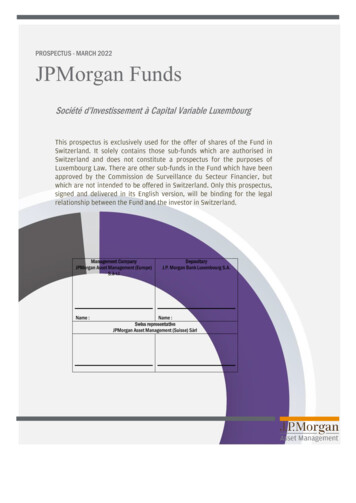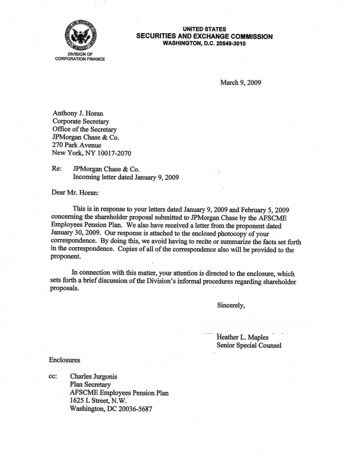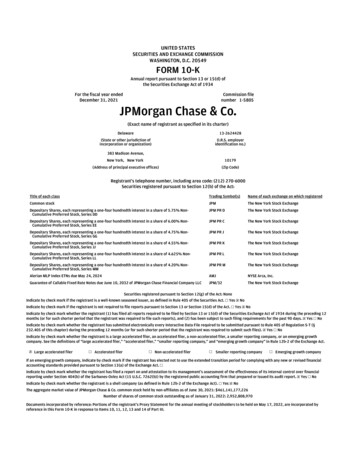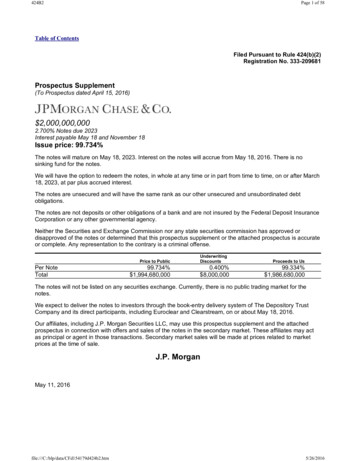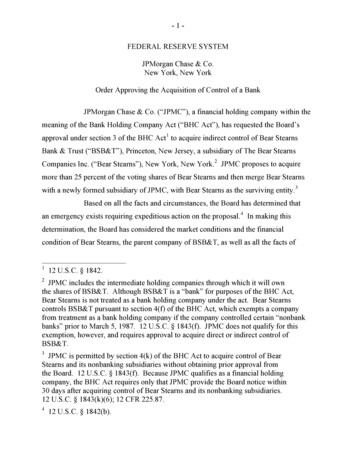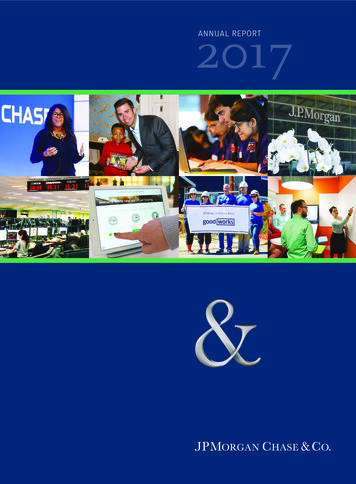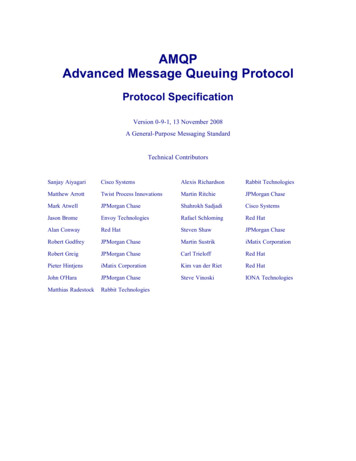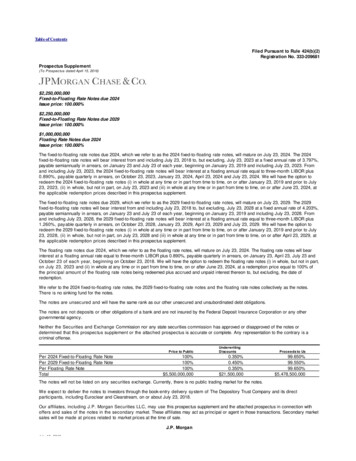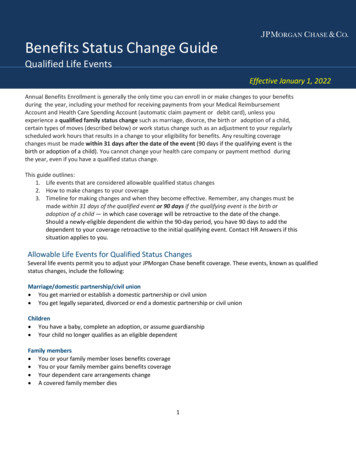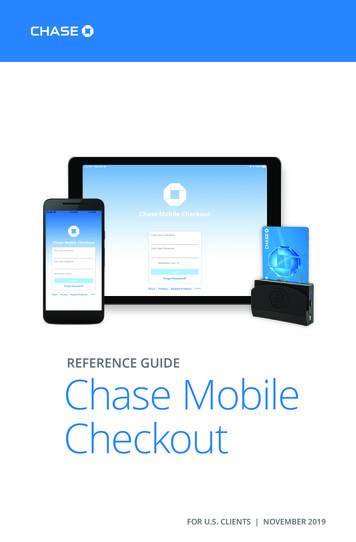
Transcription
YOURFINANCIALJOURNAL
POWERFUNDTABLE OF CONTENTSPOWER2Jumping the Financial BroomTAXES11 Finding Financial “HarMoney”SAVENEWS17 Building a Roadmap for the FutureITEMS21 Holding the VisionRATES24 Building a LegacyLOANSSURPRISESTICKETSMOVE OUTLUXURIESCONCERTSMY SAVINGSJOB CHANGESOWN A HOUSESURROUNDGET A NEW CARPARENT’S CAREYOURSELFSMALL BUSINESSWITH ONLYMUSIC FESTIVALSPEOPLE WHODEBT REDUCTIONARE GOINGCOLLEGE TUITIONTO LIFT YOURAINY DAY FUNDHIGHER.”HOME UPGR ADESOPRAH WINFREYRETIREMENT PL ANA DREAM VACATIONTO SUPPORT MY KIDSHAVE EMERGENCY FUND
Healthy relationships are the foundationof strong communities. A shared visioncan create a fnancial journey thatinspires those around you.ALIGNYOURGOALSWhen we partner with another person we bringour money beliefs, perspectives, and habits into therelationship. Often, the partnership helps us rise to newlevels and achieve more than we ever could alone.Sometimes, there isn’t a clear path to merging fnancial lives—whether you are just starting out or have been together fordecades. Building a pathway to fnancial success starts withgetting clear about where you are now and the values and visionyou share. With a shared vision as your focus, you can createa plan that honors your individuality and your relationship.1
1JUMPING THEFINANCIAL BROOMJumping the broom signifes two becoming one and represents“sweeping away” past problems and concerns. Get a fresh starton your fnancial lives no matter how long you have been together.TALK ABOUT ITSet aside time to talk about how you BOTH feel about where you are right nowand your vision for the future. Most goals will have fnancial impact so getting aclear picture about where you are now is important. It can help you focus on theareas that you share the same or similar perspectives and notice the areas that youmay have to develop shared agreements.Consider these questions as discussion topics:What are your core values? How do your money choices refect your values?What are your beliefs about money?What money messages did you learn as a child?How do early money messages affect your communication now?2
EXPLORE YOUR MONEY MINDSETEach partner should complete the statements below, then talk aboutthe areas you notice that are similar and the topics where you havedifferent perspectivesInitialsMore money.If money wasn’t an issue I would The money choice I am most proud of is The money choice I wish I could do over is Money is Write your top fve values:Identify shared values and discuss how theyimpact your fnancial choices.3
EXPLORE YOUR MONEY MINDSETEach partner should complete the statements below, then talk aboutthe areas you notice that are similar and the topics where you havedifferent perspectives.More money.If money wasn’t an issue I would The money choice I am most proud of is The money choice I wish I could do over is Money is Write your top fve values:Identify shared values and discuss how theyimpact your fnancial choices.4Initials
COUPLES MONEY MAPDescribe your short-, medium-, and long-term goals.How will money impact your journey?Short-term goals (1–5 years)Medium-term goals (5–10 years)Long-term goals (10 years)5
SMART GOALSDevelop SMART goals to clarify your ideas, manage your efforts, and directyour time and resources towards achieving you set out to accomplish.SMSPECIFICWe want to have a rainy day fund in a savingsaccount.MEASURABLEOur target is 200.AWe’ll set up a budget and prioritize saving 10 eachweek for 20 weeks.RWe often worry about money when we have afnancial setback.T6ACHIEVABLERELEVANTTIMEBOUNDWe will save 200 by (date).
Shared SMART goalGOALCOMPLETE BYPROJECTED AMOUNTA SMART GOAL IS SPECIFIC, MEASURABLE, ACTIONABLE, RELEVANT, AND TIMEBOUND.SMART7
2FINDING FINANCIAL”HAR MONEY”Now that you have explored your individual beliefs about money(and how your shared and different perspectives impact yourcurrent fnancial conversations) let’s look at the goals you havechosen to focus on and the options you have now. Partnerships arerarely 50/50 and you can choose the best approach to balancethe resources with money and effort to maximize the fnancialhealth of your relationship.TALK ABOUT ITReview your SMART goal and keep in mind that the two of you will decide how tomove forward. You may fnd that another priority has risen to the top or somethingunexpected is screaming for attention. Breathe, refocus and get grounded in theshared vision before you start the next steps.8
1. Review your SMART goal and the steps you plan to take. Who will beresponsible for the actions you agreed upon?2. How will you manage competing priorities?3. How will you manage bank and credit SeparateCombinationOrganize fnancial documentsINITIALSACTION ITEMDUE DATECOMPLETEGather documents andfnancial recordsSort (by month or category)Review (action or fle)File (electronic or paper)9
3BUILDING A ROADMAPFOR THE FUTUREWith a clear vision for your fnancial life, you can create a planwith milestones to help you stay on track and motivated on thejourney. Developing guidelines for how you will make decisionscan keep emotions in check when fnancial shocks or windfallscome into play. If you already know the basics of fnancialmanagement you have a head start. If there are some topics youare not sure about, getting reliable and trusted information canhelp you avoid pitfalls.TALK ABOUT ITConsider your combined fnancial knowledge and comfort level with the decisionsyou will need to make in order to achieve your desired outcome. Often, oneperson in the relationship feels more comfortable with the details of fnancialmanagement so keep in mind “no shame” and create a safe space to talk aboutmoney even if it is new to you or you have made some missteps in the past.1. Making money movesWhat do you know, what do you need to know about personal fnance?Review your goals and think about what information you need in order tomake progress.What milestones will help you maintain motivation andovercome obstacles?10
MAKE DECISIONS1. Create a cash fow calendar. Set up a calendar (physical or digital) thatincludes all income and outfows according to the day of the month.2. Create “money rules” for each of these topics:Budgets—how often will you review and update?Credit/Debt—how will you decide when and how to use credit and/or debt?Sharing with others/Gifts—will you make loans or gifts to others? If so, what isthe limit?11
4HOLDINGTHE VISIONPracticing any new behavior can have ups and downs, so take amoment to refect on what you have been doing and the impactyour choices have on your goals. Don’t trip if you fnd that youslipped or the actions aren’t quite as straightforward as youthought. Good thing you have a partner on this journey! Thinkabout the vision you created for your fnancial life and put itthrough the reality check.TALK ABOUT ITHave an honest (no blame or shame) conversation about what is working andwhat you want to change. Remember you are in this for the long haul and you mayhave to make adjustments along the way. Talk about the areas that have been easyAND those that have been more challenging. What’s next?What has been successful so far? What is working and what do you want to revisit?What motivates you (individually and as a couple)? How can you maintaininspiration (and action) over the long term?12
5BUILDINGA LEGACYWhat will your life and legacy look like as you continue thejourney to your goals? How can you build on what you havedone so far and what impact do you want your efforts to have onthe people you care about?TALK ABOUT ITBefore you begin this money talk, take some time to revisit the money map youcreated. Imagine the best possible outcome for all of the ideas you had andthe dreams you wrote down. Share your thoughts with each other about theimportance of each of the goals and how you envision your legacy.What will be your legacy? How will your fnancial choices supportyour intentions?How will your family and community be impacted by your approach tofnancial topics/concerns? How do you want to communicate with othersabout money/fnancial choices?LOOK CLOSELY AT THE PRESENT YOUARE CONSTRUCTING. IT SHOULDLOOK LIKE THE FUTURE YOUARE DREAMING.”ALICE WALKER13
BE ABOUT ITReview where you are now, focus on:Having a clear vision of your “why.”Creating goals with “mini-actions” that move you in the direction of yourdesired outcome.Aligning your plan for daily/weekly/monthly fnancial behaviors that areconsistent with your “why.”Staying accountable to each other. Are you on the same page? How oftenwill you review your goals and milestones?A positive money mindset; maintaining and recognizing the money thoughtsthat help and those that harm. Surround yourself with people who supportyour goals.Celebrating your progress by checking your numbers and reassessing yourgoals regularly.14
MONEY DATESSet a Schedule to talk about your goals, progress and next steps.DATETOPICCOMPLETE15
ACTION LISTLEARN MORE or TAKE ACTIONPRIORITYACTION ITEMUpdate goalsOrganize money recordsCreate/update fnancial statementsCredit management planCreate a budgetNet worth/balance sheet16DUE DATECOMPLETE
BUDGET BUILDERWORKSHEETKnowing your income and expenses isScan to access thisresource online.the frst step to managing your money.Complete this worksheet or go online toget a snapshot of your monthly spending.chase.com/budgetbuilderMONTHLY INCOME (AFTER TAXES)CATEGORYDESCRIPTIONAMOUNTIncome Income TOTALMONTHLYINCOME 0.0017
Budget builder worksheet continued.MONTHLY EXPENSESCATEGORYDESCRIPTIONAMOUNTHome Utilities Groceries Transportation Personal Debt Child Care & Tuition Health & Personal Care TOTALMONTHLYEXPENSES 0.00YOUR MONTHLY SPENDING SUMMARYTOTAL MONTHLY INCOME 18REMAININGMONTHLY SAVINGSMONTHLY EXPENSES– 0.00
BALANCE SHEET/NETWORTHA balance sheet is a snapshot of what you own and what you owe. The differenceis your “net worth.” A positive net worth can help you take advantage ofopportunities or deal with fnancial setbacks.LIABILITIESASSETSWHAT WE OWEWHAT WE OWNOur house Mortgage Our car 2nd mortgage Our furnishings Car loan Cash in bank Student loan Retirement savings Credit card balances Other Other TOTAL ASSETS TOTAL LIABILITIES 0.000.00CALCULATE YOUR NET WORTHASSETS Minus (-) LIABILITIES Equals ( ) NET WORTH19
CREDIT MANAGEMENT PLANYour credit reports change frequently so monitor all three regularly and takeaction if the information is incorrect or out of date.Complete the following:Get all three reports (TransUnion, Equifax, Experian)Check for accuracy (personal information and accounts)Look for potential fraud (accounts you don’t recognize)Dispute errorsDATEFOR NEXTCHECK UPScan to sign up for Chase Credit Journey SMfor free unlimited access to your creditscore and more.chase.com/creditjourneyRemember, each one of youhave your own credit reportand score. Joint accounts arereflected on both records.20
GLOSSARYPersonal fnancial statements: Personal fnancial statements show yourfnancial situation at a given point in time (a specifc month, or end of year). Thethree statements: cash fow, balance sheet, and net worth give you informationto monitor your income and expenses, which can help you create a plan toincrease your wealth.Cash fow statement: Your income (salaries, business income or interest income)and expenses (mortgage or rent, utilities, etc.) at a given point in time. Subtractyour expenses from your income to determine if you have a positive (money leftover) or negative (more expenses than income) cash fow. This information helpsyou plan your future spending (budget).Balance sheet: Lists your assets (what you own) and your liabilities (whatyou owe). Your assets may include bank accounts (savings, checking), realestate (home, rental property), cars or furniture. Your liabilities are any debts oroutstanding balances on the things you own.Net Worth: Your net worth is the difference between what you own and whatyou owe and represents your “wealth” because it shows the balance of yourassets once all of your debts are paid off. If you have more assets than debt youhave a positive net worth. If you have more debt than assets you have a negativenet worth.21
NOTES22
23
NOTESKEEP THE CONVERSATION GOINGSchedule anHelp your child takeFind ways to helpappointment with athe next step withboost yourChase banker toour resourcesfinancial healthsee how we can helpand advice.meet your goals.24
POWREASONCONGRATULATIONS on completing thisPOWpart of the journey. By now you knowTAXthat making change is easier when youSAVbelieve change is possible, AND youNEWhave the tools that can help. You andITEMyour partner have started the CurrencyRATConversations so now is the time to makeLOANthe plan for where you will go next.SURPRISWhat is YOUR next fnancialTICKEgoal together?MOVE OUWhat are you going to do to achieve it?LUXURICONCERMY SAVINGJOB CHANGOWN A HOUGET A NEW CAPARENT’S CASMALL BUSINEMUSIC FESTIVADEBT REDUCTIOCOLLEGE TUITIOHOME UPGRADRETIREMENT PLAA DREAM VACATIOTO SUPPORT MY KIDHAVE EMERGENCY FUNINVESTMENT PROPERTIMY PERFECT WEDDIN
For Informational/Educational Purposes Only:The author ’s views may differ from other employeesand departments of JPMorgan Chase & Co. Viewsand strategies described may not be appropriate foreveryone, and are not intended as specifc advice/recommendation for any individual. You shouldcarefully consider your needs and objectives beforemaking any decisions, and consult the appropriateprofessional(s). Outlooks and past performance are notguarantees of future results.Deposit products provided by JPMorgan Chase Bank,N.A. Member FDIC 2021 JPMorgan Chase & Co.
A balance sheet is a snapshot of what you own and what you owe. The difference is your "net worth." A positive net worth can help you take advantage of . Student loan Credit card balances Other TOTAL LIABILITIES CALCULATE YOUR NET WORTH . ASSETS Minus (-) LIABILITIES Equals ( ) NET WORTH 19 . CREDIT MANAGEMENT PLAN .
